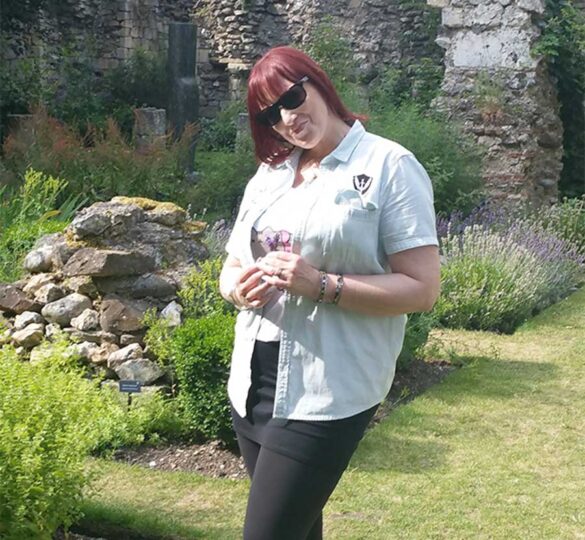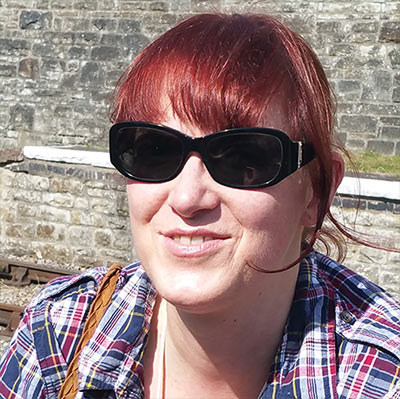Niki’s Story: Putting a Positive Spin on her Glaucoma
"Whatever curves life throws at us, I believe one must always make the best out of a situation; there is always a positive side." - Niki De Lara

After my experiences with uveitis, glaucoma, operations, sight loss, medicine routines, and changing ways of life, I can only use all this to make the way forward more positive.
In July 2017, I started a blog and website, because I wanted to help others who need information and support, or might be having a bad day. Just the feeling of knowing we aren’t alone can bring a massive change in outlook. Friendly support from various glaucoma groups has helped me in knowing I’m not alone. Every person’s experience is different, but I hope that by sharing my story, it will help to give faith, insight, and courage to many others.
Uveitis
When I was 32, I was diagnosed with uveitis for the first time. I had never heard of uveitis. It was painful and I was put on a course of eye drops which cleared it up. It was in my weaker, short-sighted eye. Quite a few more episodes happened over the next several years. I had more drops and pills, which were effective and worked quickly. I always had regular eye tests and pressure tests, but uveitis seemed to be my weak point.
Each time the uveitis appeared the steroid drops cleared it away. I was so used to being able to clear it up, or have drops to bring down elevated eye pressure, that it was a shock when I was in my forties and suddenly faced with this being a more serious problem. Over time, I had taken a lot of steroids and medicines in my eye that had limited vision (it had been my “bad” eye since I was 11.)
Meanwhile, I didn’t realize that these problems were causing the cells to die in my optic nerve (causing glaucoma) and they were continuing to slowly die even when taking medicines. Information was limited, which is another reason that I want to create more awareness about this disease.
Glaucoma and the Loss of Sight in One Eye
In early 2014, I was sitting at my familiar eye exam expecting to be prescribed the usual medicines to help again, when suddenly I heard the word “operation.” This took me by surprise. My words to my doctor were: “But I always have these drops – and all goes back to normal then!”
I had been experiencing pain; I had an attack of uveitis. I had the usual blurry, cloudy, watery vision. I had been using the regular prescribed steroid eye drop for the inflammation. I was also taking “carbonic anhydrase” which suppress fluid production, and miotics to help with the drainage.
However, one side effect is that they constrict the pupil, which makes it difficult to see. I did realize that things were not improving, but I also thought that there would be some different eye drops or pills to help. I still knew very little about glaucoma – I was only actually familiar with uveitis. My vision had become extremely poor in my right eye. I was experiencing pain and blurred vision and using my “good” left eye much more to compensate. Because of the uveitis, the miotics constricting the pupil, and the fact that the cells in my optic nerve were dying so fast, I didn’t realize I was quickly going blind in my right eye.
This is where glaucoma is not just “black or white.” It cannot be put into a box where all the symptoms make sense. It was a massive shock to both me and my husband on the day we were told there was little left of the optic nerve in my right eye and that there was actually no way out of this. Looking back, I can see that I had experienced many years of problems with this eye, had a large amount of various strong eye drops over the years, and a build-up of scar tissue had formed – and this caused serious drainage problems.
My Trabeculectomy
Whilst it was too late to save the sight in my right eye, I was scheduled for an operation called a trabeculectomy, to sort out the drainage channels and make sure pressure couldn’t build-up in the eye anymore. At the time of the operation, I only had “light perception” remaining in the eye – mostly black with a strange glare. By this time I could no longer see from my right eye. Strangely enough, I was used to it. But I could cope. I always do.
When I was introduced to my glaucoma surgeon, Nitin Anand, MBBS, MD (Ophth), FRCSEd, FRCOphth, I knew I would be fine. He immediately instilled faith, calmness, and confidence about what would be happening. I took good care of myself before the operation. I had loving support from my husband, my beloved cat, and my faith. I had a general anesthetic and the operation went well. I was looked after extremely well, and my surgeon explained everything thoroughly. I still had my “good” left eye and was filled with gratitude that I could still see. The aftercare was also excellent.
I had plenty of recovery time and thankfully the eye looked okay. I was relieved, but glare hurt and it still does; hence I wear my dark prescription glasses most of the time. But I strongly believe if you can start the day with a smile and not complain, then you have far more chance of coping with whatever problems come up. Of course, many aspects of my life had to change. But with faith, patience, time and loving support I have realized I am okay. I just always need to be patient with myself.
Saving My Eyesight
My “good” left eye had always been fine, although it was doing far more work now. But one year after my trabeculectomy operation, I developed severe blurriness in my good eye. With this eye being the only sight I had, I became disorientated and scared. Now this eye was suddenly troubled with uveitis and high pressure. Sometimes a long standing problem can suddenly affect another part of the body; but I knew something was very wrong.
I had an emergency appointment to see my surgeon the same day I phoned the hospital. As always, Dr. Anand was very calm, but the situation was urgent, as my intraocular pressure was off the scale at 80! He asked me if I had eaten, gave me two pills to take, and I had to wait twenty minutes. In that time I walked to the pharmacy at the hospital to get the long list of medicines he prescribed − more than I had ever taken before. After ten minutes had passed, I began to feel a little better; the tablets were working and I could feel my eye becoming less blurred. I felt less sickness and pain.
My surgeon, Dr. Nitin Anand, saved my vision again that day. He booked me in to have a deep sclerectomy, which is less intrusive than a trabeculectomy. I had to wait a few weeks but I was checked regularly and on a strict eye drop routine. I had a big bag of various drops that I had to put in every hour, and the side effects were awful in some. But my eye pressure went back down to 21. It was a very scary time, but again, with massive support, I got through it.
The deep sclerectomy went well. My vision took six weeks to come back properly, so I had a very blurry and challenging time. But the sight in my good eye had been saved. It felt like a true miracle. My cat was a huge comfort; she always knew when something was wrong and she cuddled up with me after I got home. I must say my faith strengthened even more in those six weeks. If you love animals they can help enormously with relaxing and healing therapy.
Gratitude and Faith
After those few hours that March day in 2015 when my pressure was off the scale and I was possibly hours from total blindness, I have learned to never take anything for granted − to be thankful for all I have each and every day. I’ve learned to look after myself better and be thankful for who I am. I wake up each morning with gratitude that I can see the beautiful world and those I love. The realization of health being the most important thing is now so true to me. There is no time to waste energy on negative things or worry.
I am truly blessed as my husband is now “my head of security” wherever I go. We have been fortunate to spend a lot of time by the coast. The fresh sea air is so much better for my eyes, with less irritations compared to the pollution inland.
I’m sure many who read this can relate to my situation in some way, and although I realize everyone’s experience is different and individual, I really hope my story helps other glaucoma sufferers.
Never give up!
Posted on May 21, 2018 — Reviewed March 18, 2022

Niki De Lara
Niki De Lara became an advocate for glaucoma education and awareness following serious uveitis and glaucoma that included the loss of her sight in one eye. Niki shared her personal story with GRF in 2018. To read more about Niki, visit her website at www.glaucomarize.org